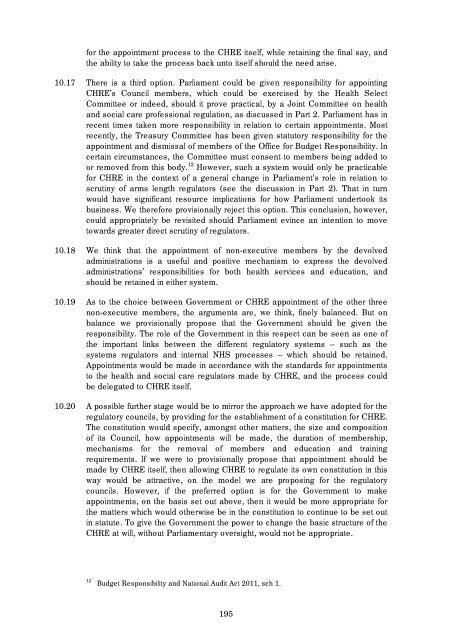Regulation of Health and Social Care Professionals Consultation
Regulation of Health and Social Care Professionals Consultation
Regulation of Health and Social Care Professionals Consultation
Create successful ePaper yourself
Turn your PDF publications into a flip-book with our unique Google optimized e-Paper software.
for the appointment process to the CHRE itself, while retaining the final say, <strong>and</strong><br />
the ability to take the process back unto itself should the need arise.<br />
10.17 There is a third option. Parliament could be given responsibility for appointing<br />
CHRE’s Council members, which could be exercised by the <strong>Health</strong> Select<br />
Committee or indeed, should it prove practical, by a Joint Committee on health<br />
<strong>and</strong> social care pr<strong>of</strong>essional regulation, as discussed in Part 2. Parliament has in<br />
recent times taken more responsibility in relation to certain appointments. Most<br />
recently, the Treasury Committee has been given statutory responsibility for the<br />
appointment <strong>and</strong> dismissal <strong>of</strong> members <strong>of</strong> the Office for Budget Responsibility. In<br />
certain circumstances, the Committee must consent to members being added to<br />
or removed from this body. 12 However, such a system would only be practicable<br />
for CHRE in the context <strong>of</strong> a general change in Parliament’s role in relation to<br />
scrutiny <strong>of</strong> arms length regulators (see the discussion in Part 2). That in turn<br />
would have significant resource implications for how Parliament undertook its<br />
business. We therefore provisionally reject this option. This conclusion, however,<br />
could appropriately be revisited should Parliament evince an intention to move<br />
towards greater direct scrutiny <strong>of</strong> regulators.<br />
10.18 We think that the appointment <strong>of</strong> non-executive members by the devolved<br />
administrations is a useful <strong>and</strong> positive mechanism to express the devolved<br />
administrations’ responsibilities for both health services <strong>and</strong> education, <strong>and</strong><br />
should be retained in either system.<br />
10.19 As to the choice between Government or CHRE appointment <strong>of</strong> the other three<br />
non-executive members, the arguments are, we think, finely balanced. But on<br />
balance we provisionally propose that the Government should be given the<br />
responsibility. The role <strong>of</strong> the Government in this respect can be seen as one <strong>of</strong><br />
the important links between the different regulatory systems – such as the<br />
systems regulators <strong>and</strong> internal NHS processes – which should be retained.<br />
Appointments would be made in accordance with the st<strong>and</strong>ards for appointments<br />
to the health <strong>and</strong> social care regulators made by CHRE, <strong>and</strong> the process could<br />
be delegated to CHRE itself.<br />
10.20 A possible further stage would be to mirror the approach we have adopted for the<br />
regulatory councils, by providing for the establishment <strong>of</strong> a constitution for CHRE.<br />
The constitution would specify, amongst other matters, the size <strong>and</strong> composition<br />
<strong>of</strong> its Council, how appointments will be made, the duration <strong>of</strong> membership,<br />
mechanisms for the removal <strong>of</strong> members <strong>and</strong> education <strong>and</strong> training<br />
requirements. If we were to provisionally propose that appointment should be<br />
made by CHRE itself, then allowing CHRE to regulate its own constitution in this<br />
way would be attractive, on the model we are proposing for the regulatory<br />
councils. However, if the preferred option is for the Government to make<br />
appointments, on the basis set out above, then it would be more appropriate for<br />
the matters which would otherwise be in the constitution to continue to be set out<br />
in statute. To give the Government the power to change the basic structure <strong>of</strong> the<br />
CHRE at will, without Parliamentary oversight, would not be appropriate.<br />
12 Budget Responsibility <strong>and</strong> National Audit Act 2011, sch 1.<br />
195
















